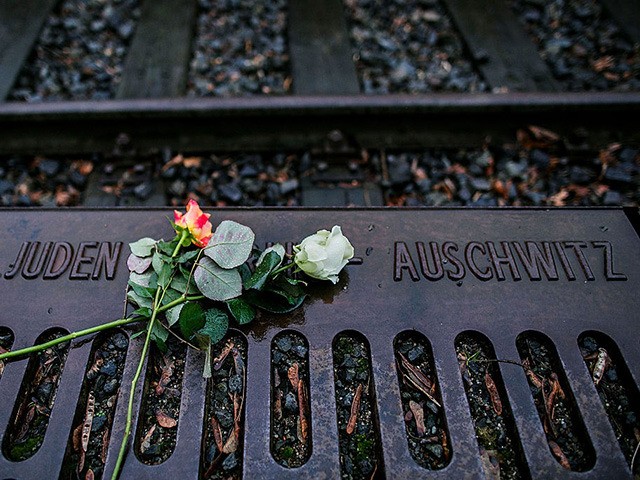Descriptions of Immigration and Customs Enforcement’s (ICE) migrant detention facilities and concentration camps “cheapen” the Holocaust, said Dean Reuter, author of The Hidden Nazi: The Untold Story of America’s Deal with the Devil and general counsel, vice president, and director of the Practice Groups of the Federalist Society for Law and Public Policy, in an interview on the 75th anniversary of the liberation of Auschwitz on Monday’s edition of SiriusXM’s Breitbart News Daily with host Alex Marlow.
Marlow noted left-wing and Democrat comparisons between President Donald Trump and tyrants, “We’re bastardizing what it means [to be a Nazi], and we’re cheapening the [term] Nazi at an incredible level. It seems very dangerous to me.”
Reuter concurred, “I agree with you. … I’ve heard expressions of what’s happening on the southern border at a concentration camp, and you’re right, it’s wrong to cheapen and start making comparisons to the Holocaust or what happened in the Holocaust. That’s not helpful. What is helpful, I think, is shows like this that will talk about the Holocaust seriously, bring it back to people’s memories.”
LISTEN:
Likening ICE’s migrant detention facilities to concentration camps and the “kids in cages” Democrat talking point are parts of a “false narrative,” noted Marlow, noting comparisons made “between a place with color television and jugs of Gatorade and fresh clothing” and Auschwitz.
Reuter replied, “There is no comparison. … That’s point number one. [People in] Nazi concentration camps, of course, were people that were collected against their will. They were forced from their homes, typically into ghettos, and then from there collected into concentration camps, and the purpose was two-fold.”
“There was some tension in the German hierarchy about this,”continued Reuter. “Many of them wanted to kill all of the Jews immediately. Others wanted to enslave the healthy Jews so they could contribute to the Nazi war effort. There was this sort of uneasy compromise, and what was decided is they do both, and Auschwitz was a perfect example of that. It was a killing camp, but it was also a slave labor camp.”
A Nazi death camp’s barracks typically allotted space per prisoner equivalent to a coffin, stated Reuter. “I found a camp that had a survival rate of 20 percent,” he explained. “So after a year of working as a slave, you had a one-in-five chance of remaining alive. That’s not happening anywhere in the United States.”
Reuter went on, “One camp [was] described as ‘comparatively good and clean,’ and it had a death rate of 27 percent. So there you had a one-in-four chance of dying [within a year], and that was considered ‘comparatively good and clean’ as a concentration camp. These were places that were designed as labor camps, but to be sure, the goal was to work people to death as slaves. You were either killing them outright or trying to work them to death.”
Reuter highlighted the importance of newsreel footage documenting what Allies saw at Auschwitz and other death camps following their liberation.
“What was discovered at Auschwitz and Dachau and their camps [was] so astounding and so unbelievable,” Reuter remarked. “That’s why we have the newsreel films we have today. General Eisenhower insisted that film crews come in and document this, because he found it so unbelievable. His big concern was that this was information had to be presented visually, because otherwise people wouldn’t believe it. There would be denials, and of course, that came to be true.”
“If it hadn’t been for those newsreels, I think many people really couldn’t wrap their minds around what exactly happened in the Holocaust,” determined Reuter.
Reuter concluded with reflection upon an interview he conducted with a Holocaust survivor.
“One of the survivors — who I describe as a hero in the book, The Hidden Nazi — he was liberated,” recalled Reuter. “His entire family except for one brother had been killed at the outset, just in the blink of an eye, and I watched this man tell his story, standing in his kitchen with him. He’s an incredible human being, and I think he’s not atypical. He’s probably typical of most of the survivors we’re with today. He’s gotten to a point in his life where he realizes he can’t explain what happened — there’s some level of acceptance — but he’s been able to move past it, and he has a joy in his life.”
Reuter concluded with an observation on gratitude, “He focuses on the people who, along his travails, were helpful to him, a guard who slipped him a piece of bread, a fellow worker who helped him up, some partisans who attacked a train he was being shipped on and tried to liberate him. Those are the things he concentrates on. Those are the things that he keeps in the inner chambers of his heart, and that’s his method of survival, and I imagine it’s duplicated by a lot of survivors, to focus on the good things that happened to [them].”
Breitbart News Daily broadcasts live on SiriusXM Patriot 125 weekdays from 6:00 a.m. to 9:00 a.m. Eastern.
Follow Robert Kraychik on Twitter.

COMMENTS
Please let us know if you're having issues with commenting.